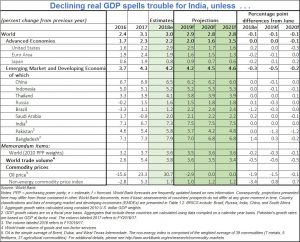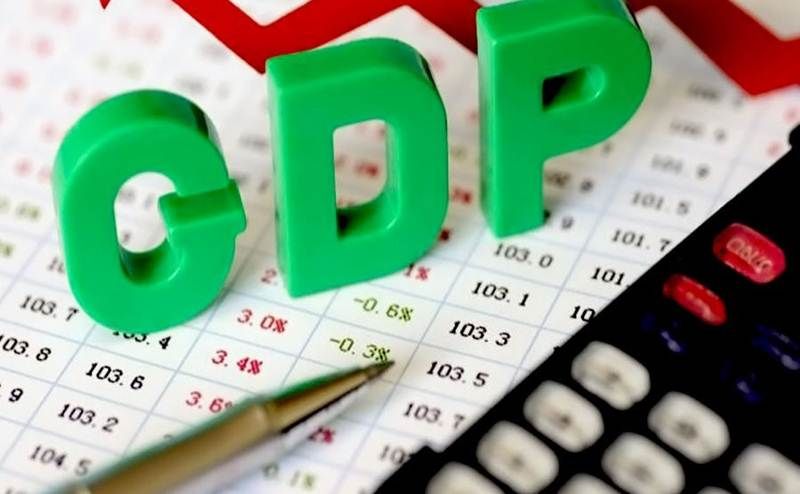https://www.freepressjournal.in/editorspick/declining-global-gdp-spells-trouble/1438297
Declining global GDP spells trouble for India
RN Bhaskar — 17 January 2019
For a long time, Indians liked to believe that their country was insulated against global developments. Not any more. In fact, with slowing exports, and rapidly increasing imports, India’s balance of trade is set to get worse.
 The country’s present prescription is that we must try and increase exports. But that is an unrealistic expectation. You can export easily in a growing market, not in a shrinking one. Add to that trade barriers – thanks to a charming Donald Trump. Exports could run into headwinds.
The country’s present prescription is that we must try and increase exports. But that is an unrealistic expectation. You can export easily in a growing market, not in a shrinking one. Add to that trade barriers – thanks to a charming Donald Trump. Exports could run into headwinds.
Moreover, India has often focussed on exports to the US. But it faces an economic slowdown there, (see chart alongside). Obviously, the World Bank report – Global; Economic Prospects: Darkening Skies – published on January 8 2019, does not pain a very cheerful picture (https://openknowledge.worldbank.org/bitstream/handle/10986/31066/9781464813863.pdf ). The chart alongside has been gleaned from that report.
So what does India do? Well, it has three options.
First, it could start wailing and get ready to hold out a begging bowl. Not many in the world would care to be as charitable as they used to in the past. Second, it could use the worsening economic climate to blame the previous government – irrespective of who comes to power by the third quarter of 2019. Indian politicians are known to have done this with quite some sophistication. Third, it could come to terms with what is going to happen, and realign itself to the changed circumstances.
So here is what a savvy leader could do. He would know that exports are going to be difficult – except in some areas like information technology. That leader would immediately put into action a plan to reduce imports instead.
But won’t import reduction result in a contraction of the economy? Not really. If import of select items – say oil and gas – were to be reduced, India could do quite well for itself. But how? One good way would be to focus on two strategies that this author has constantly mooted – focus on rooftop solar and waste to methane.
Rooftop solar (http://www.asiaconverge.com/2017/12/sabotaging-rooftop-solar-and-employment-generation/) has the potential of creating some 80 million jobs within a couple of years. It would also reduce the country’s dependence on imported oil, gas, and coal. What is more important is that employment creates purchasing power, which in turn triggers growth in industries. This is one way to help India escape the coming crisis. It would also be politically palatable, because young people need jobs desperately. But the government would need the will-power to dismantle state electricity power grids, especially those which are haemorrhaging.
Then look at waste to energy (http://www.asiaconverge.com/2018/04/shit-can-mean-big-money/). As this author has often pointed out, excreta alone has the potential of generating wealth of around Rs.18 lakh crore each year. That is higher than the entire balance of trade of around Rs.7.4 lakh crore. It is also higher than the entire petrol, oil and gas bill which ranged between Rs.5-8 lakh crore rupees each year. But this will need some very careful urban and rural planning to ensure that the waste is collected.
And do bear in mind that is only for starters. The main menu of agricultural waste to methane could generate wealth that is 2-4 times larger. Moreover, clean fuel would contribute to the country in two ways. It would reduce the need to burn firewood, thus preventing deforestation. Additionally, it would reduce the fumes that women and children have to breathe in while gathering around smoking cooking areas fuelled by firewood or other agricultural waste.
There is a third strategy that India could adopt – almost overnight. The country could encourage the building of around two million houses each year. Construction can be a big employer. Moreover, the labour, land, cement, sand, steel all come from domestic supply. There is no inflation of import bills. But that would mean that the government will have to create rules and policies that disincentivise politicians from making money from real estate. That will be possible only if the houses built are in large numbers.
Once housing supply becomes abundant, black-marketing of real estate will fall. And the ability of politicians and bureaucrats to find ingenious ways of creating quotas for housing will be nipped in the bud. This is what Iran did (http://www.asiaconverge.com/2015/03/762affordable-housing-what-india-can-learn-from-iran/). India should learn from that country.
If India can adopt the three strategies outlined above, it could see its GDP growth climb despite the global downturn.
More importantly, it could put India into a higher growth trajectory.
But, as the old saying goes, will be government be willing?



































COMMENTS